We purchased five toys touted as “indestructible” for a comprehensive evaluation: The Nylabone Extreme Tough Dog Chew Toy, The Kong Rewards Ball, The CyunCmay Indestructible Dog Toy Bone, The Hetoo Indestructible Squeaky Dental Care Dog Toy, and The Kong Wobbler. These toys underwent a week of intense chewing, playing, water submersion, burying, and rediscovery. Here’s what our canine experts had to say about each.
Nylabone Extreme Tough Dog Chew Toy: A Champion of Durability
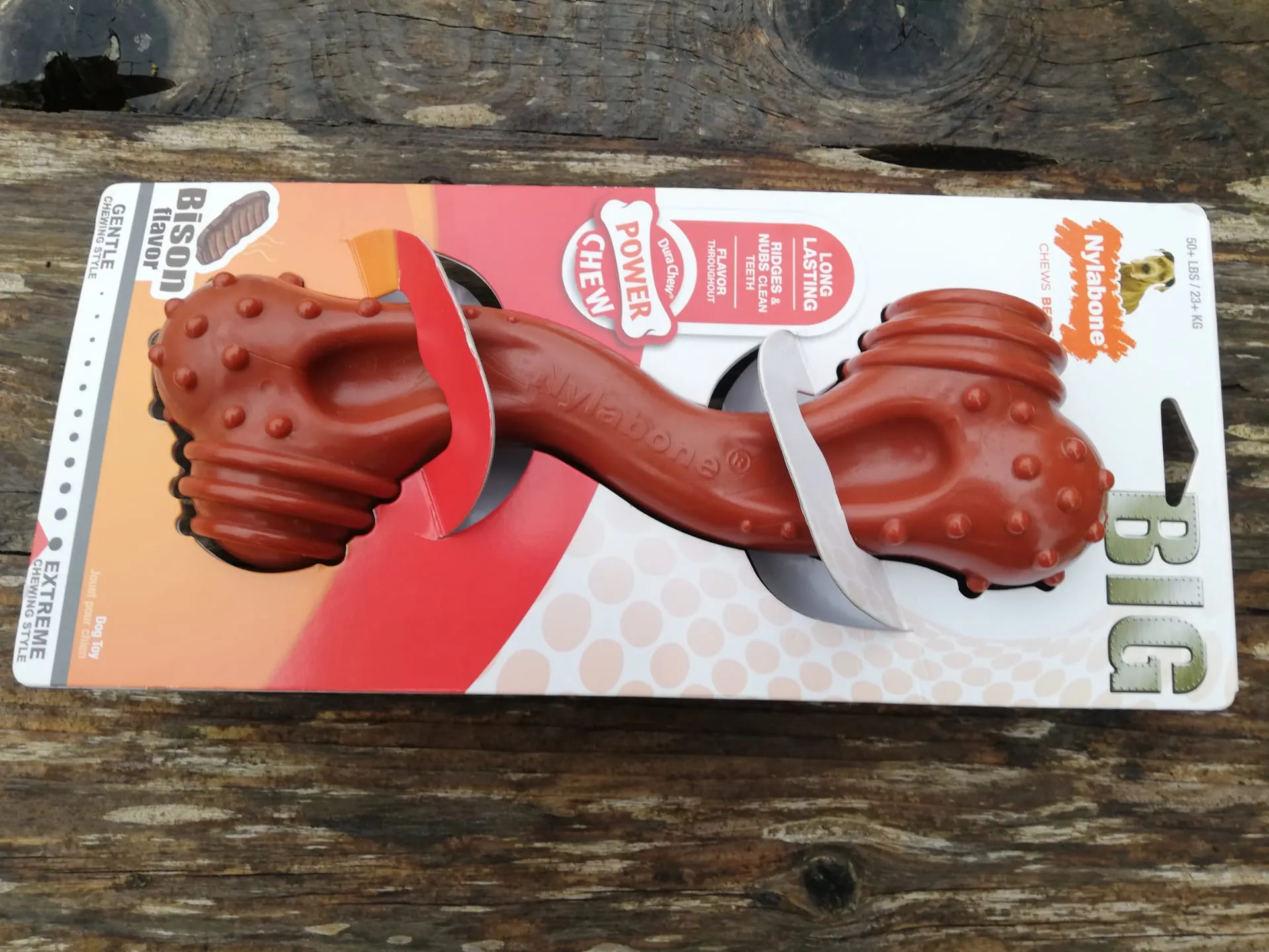
The Nylabone Extreme Tough Dog Chew Toy, in its XXL Bison flavor, claims to be ideal for powerful chewers and dogs over 23kg. Nero, our 9-year-old Pitt bull, who possesses a remarkably sharp intellect, spent hours gnawing on this toy, leaving barely a mark. Its substantial size is surprisingly light, making it easy for dogs to carry. The slightly curved design provides an excellent grip, enhancing the chewing experience and satisfaction.
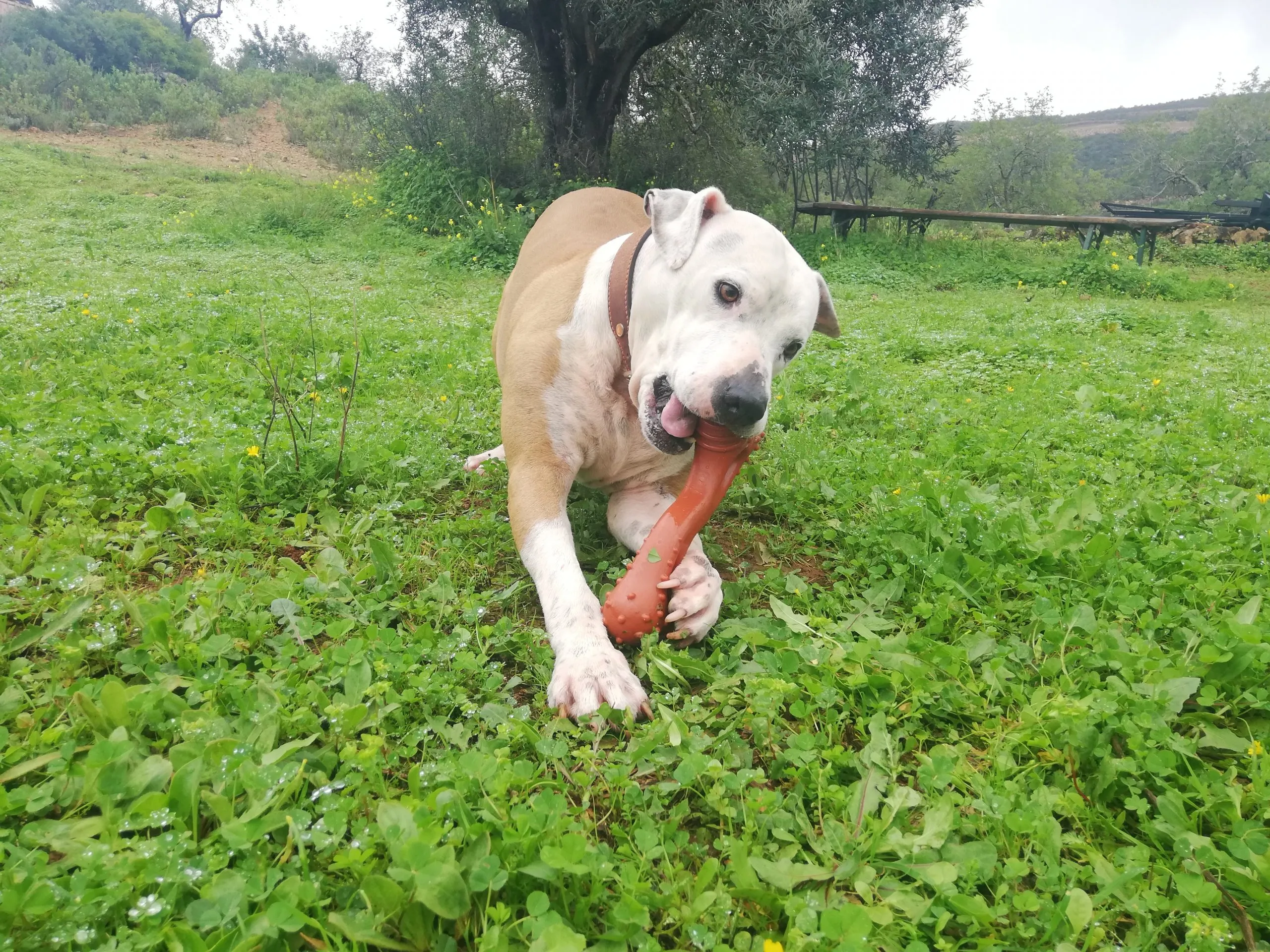
Maya, a 3-year-old who initially lacked experience with toys, took to the Nylabone immediately. Having been abandoned and fearful of humans, she likely had no toys in her early life. However, the Nylabone was not met with confusion; Maya was instantly engaged, enjoying a good chew and playfully running with it, which in turn encouraged Max and others to chase her.
This toy is exceptionally easy to clean, provided you can pry it from an enthusiastic dog! A significant advantage for mess-averse owners is that the Nylabone retains its flavor indefinitely. Furthermore, there’s no unpleasant smell or mess associated with it.
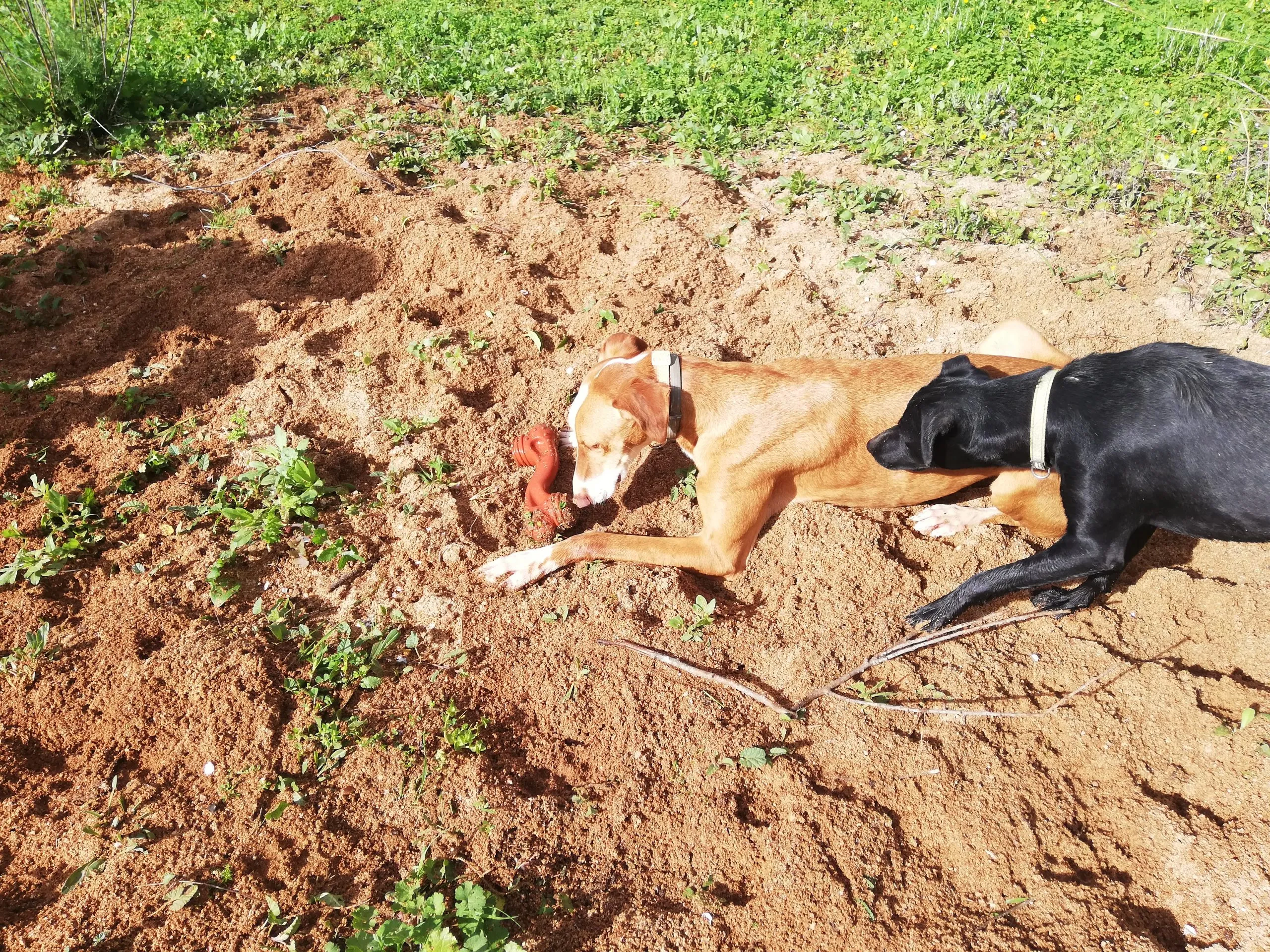
Black Nero, known for his formidable chewing power, can dismantle even large tree trunks as if they were mere twigs. When anxious, he has been known to chew and bend sturdy fencing. This Nylabone proved to be Black Nero-proof, and he thoroughly enjoyed it. After extensive chewing, only faint teeth marks were visible on the bone.
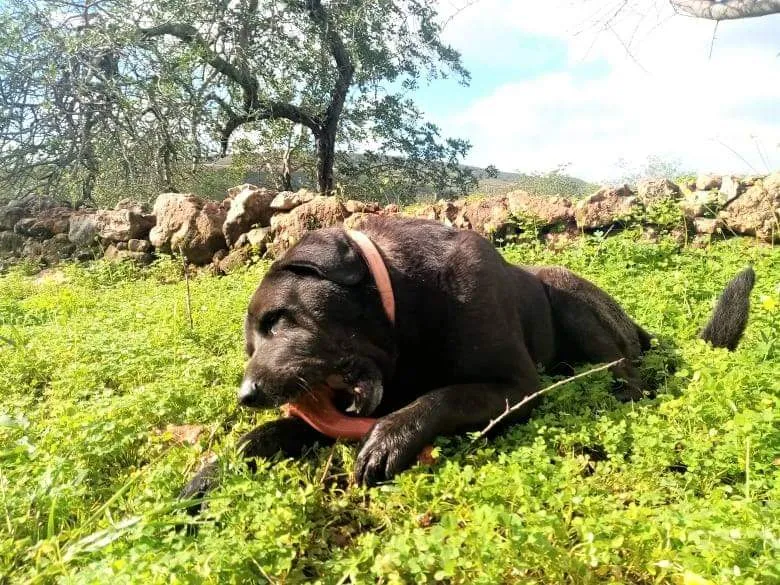
Gallery of dogs playing with the toy (click to enlarge)
[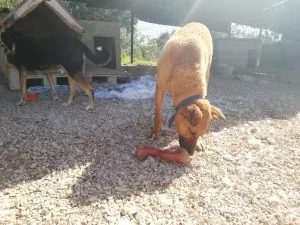
Komo
](https://www.rescuedogs.co.uk/wp-content/uploads/2021/02/kilo-nylabone-1024×768.jpg “Komo”)
[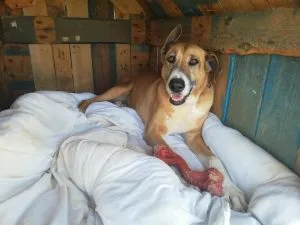
Nora
](https://www.rescuedogs.co.uk/wp-content/uploads/2021/02/nora-nylabone-1024×768.jpg “Nora”)
[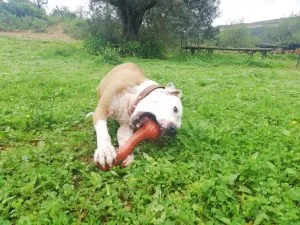
White Nero
](https://www.rescuedogs.co.uk/wp-content/uploads/2021/02/white-nero-nylabone-2-1024×768.jpg “White Nero”)
The Details
- Flavor: Bison flavored throughout (also available in chicken and turkey)
- Features: Raised nubs to aid in cleaning teeth and gums.
- Safety: Safe and non-toxic.
- Measurements: 30.48 x 13.97 x 5.08 cm
- Weight: 485 grams
- Recommended for: Dogs over 23 kg
Summary
All the dogs at the shelter wholeheartedly recommend this Nylabone. Their collective advice: if you have a dog who loves to chew, gets bored easily, and needs a tasty and durable toy, this is the perfect choice. For those seeking good dog toys for strong chewers, this Nylabone is a top contender.
Kong Rewards Ball: A Clever Treat Dispenser
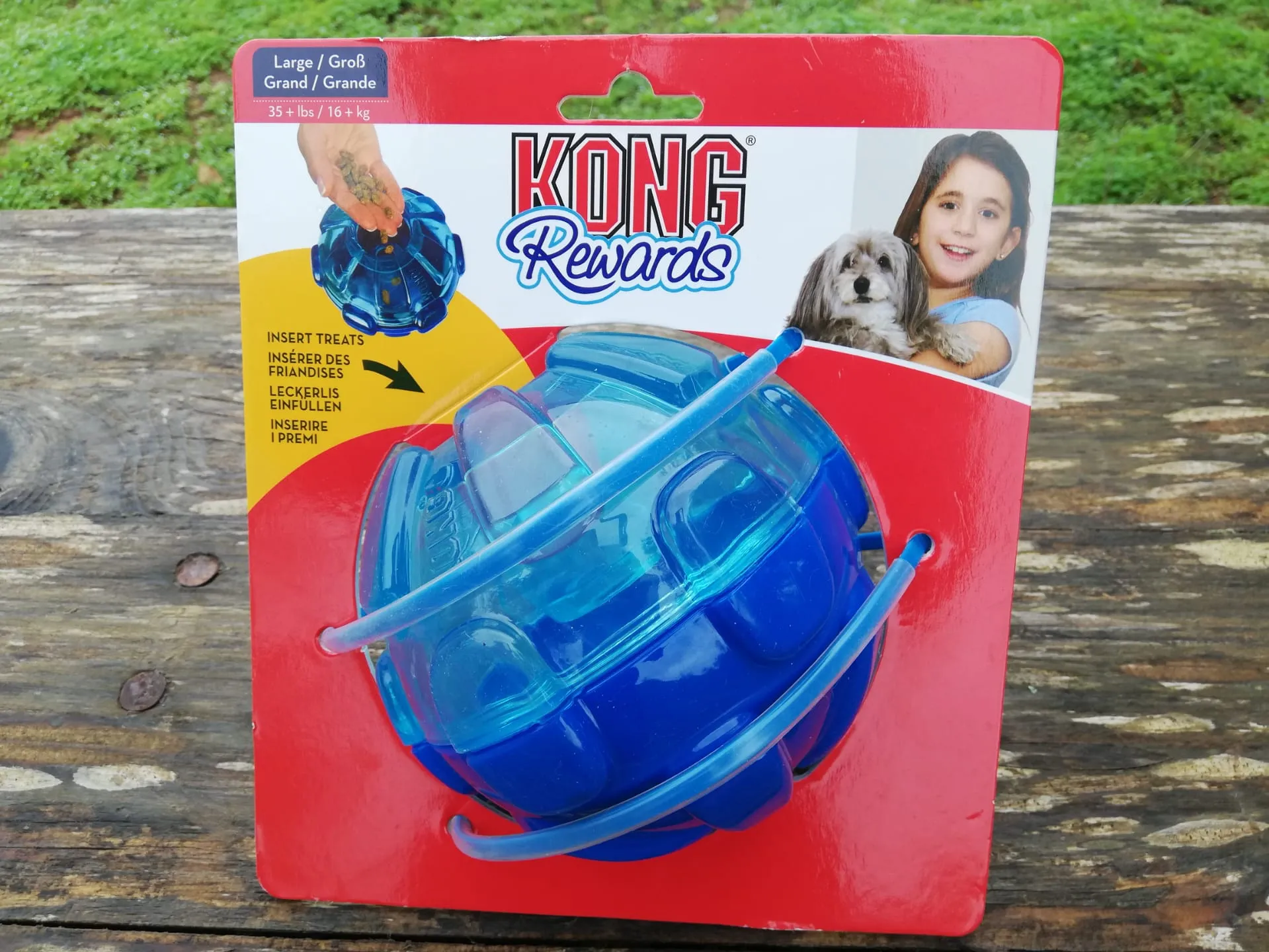
The Kong Rewards Ball did not initially elicit the same level of enthusiasm from our dog reviewers as some other toys. However, this was a short-lived reaction. The concept of a toy that dogs can play with independently while also dispensing treats is highly clever. For humans, filling the ball with treats was straightforward, and it didn’t require excessive effort from the dogs to access them.
Interestingly, the dogs seemed to favor the soft, bouncy rubbery side of the toy over the treat-dispensing aspect.
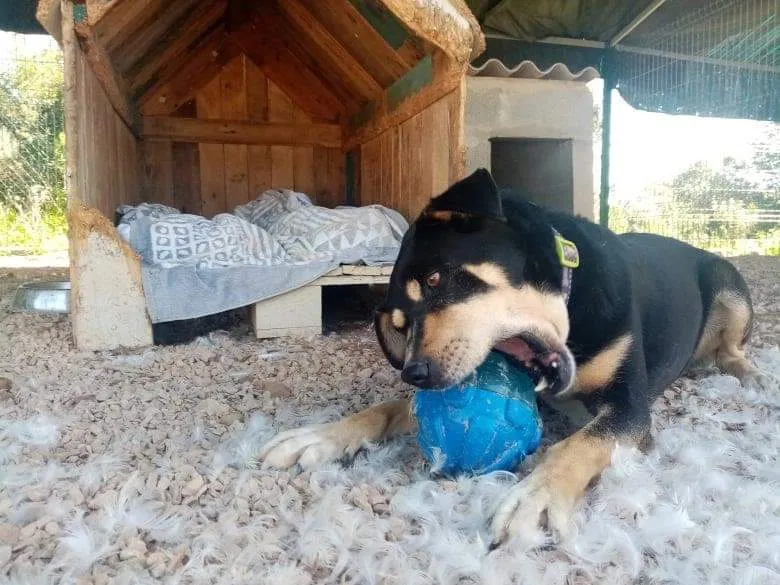
Jean absolutely adored this toy, to the point where he repeatedly buried it, engaging in hours of chewing before re-discovering it. His friend Komo was often left out, much to his dismay.
But don’t just take Jean’s word for it; our other dogs also provided their feedback.
Gallery of various dogs testing, click to enlarge
[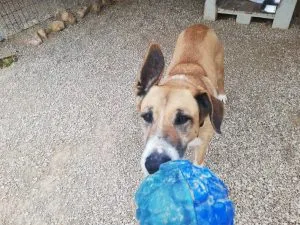
Nora
](https://www.rescuedogs.co.uk/wp-content/uploads/2021/02/nora-kong-treat-ball-1024×768.jpg “Nora”)
[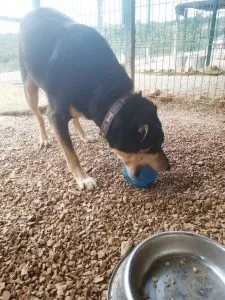
Jean
](https://www.rescuedogs.co.uk/wp-content/uploads/2021/02/jean-biting-kong-treat-ball-768×1024.jpg “Jean”)
[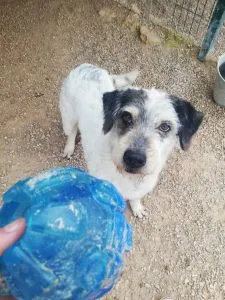
Baldo
](https://www.rescuedogs.co.uk/wp-content/uploads/2021/02/baldo-kong-treat-ball-768×1024.jpg “Baldo”)
[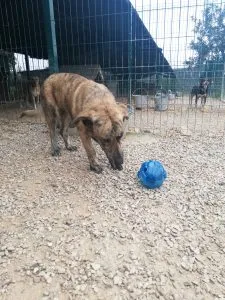
Star
](https://www.rescuedogs.co.uk/wp-content/uploads/2021/02/star-kong-trea-ball-768×1024.jpg “Star”)
[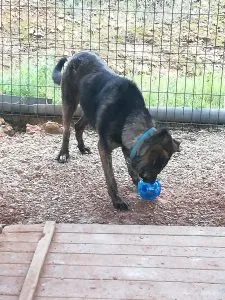
Jambo
](https://www.rescuedogs.co.uk/wp-content/uploads/2021/02/jambo-kong-treat-ball-768×1024.jpg “Jambo”)
From the largest Jambo to the smallest Star, every dog at the shelter engaged with this toy. No tooth marks were found, and all treats were successfully dispensed. This confirms it’s an effective and straightforward treat dispenser.
The Details
- Measurements: 12.7 x 12.7 x 12.07 cm
- Weight: 417 Grams
- Recommended for: Dogs of 16 kg and above
Summary
Our dogs found this to be a well-rounded toy that combines two of their favorite activities: play and food. It’s a durable and tough toy that withstands significant chewing and interactive play, while also serving as a simple and effective treat dispenser. For a robust option among best chew toys for dogs that like to chew, this Kong Rewards Ball is a solid choice.
CyunCmay Indestructible Dog Toy XL Bone: Short-Lived Fun
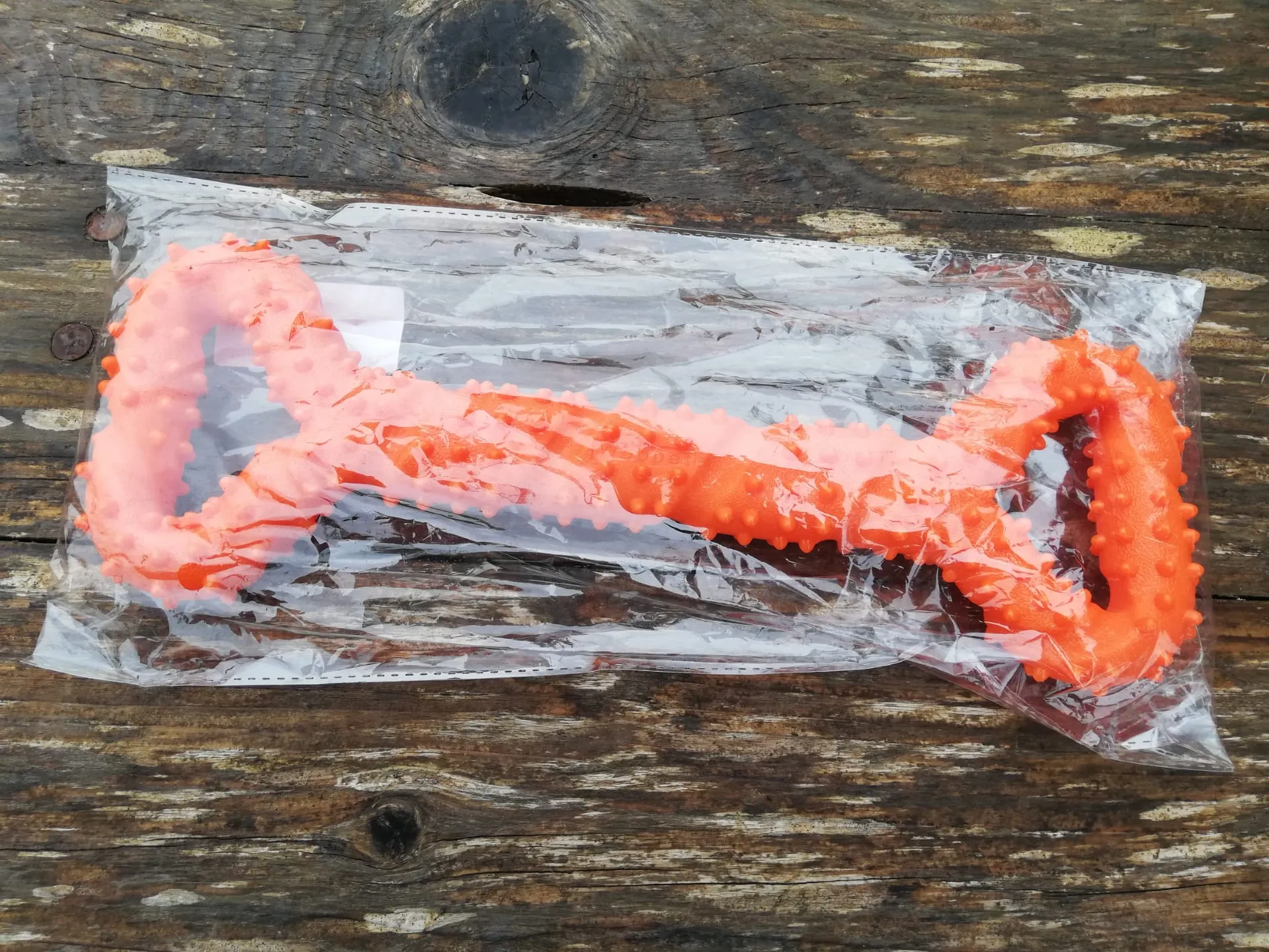
The CyunCmay toy generated the most initial excitement among the dogs. Unfortunately, this enthusiasm was short-lived, especially when Black Nero got a hold of it. While he had immense fun for about 30 minutes, playing tug-of-war with the handles, chewing, and fetching it from the lake, the toy’s durability was questionable.
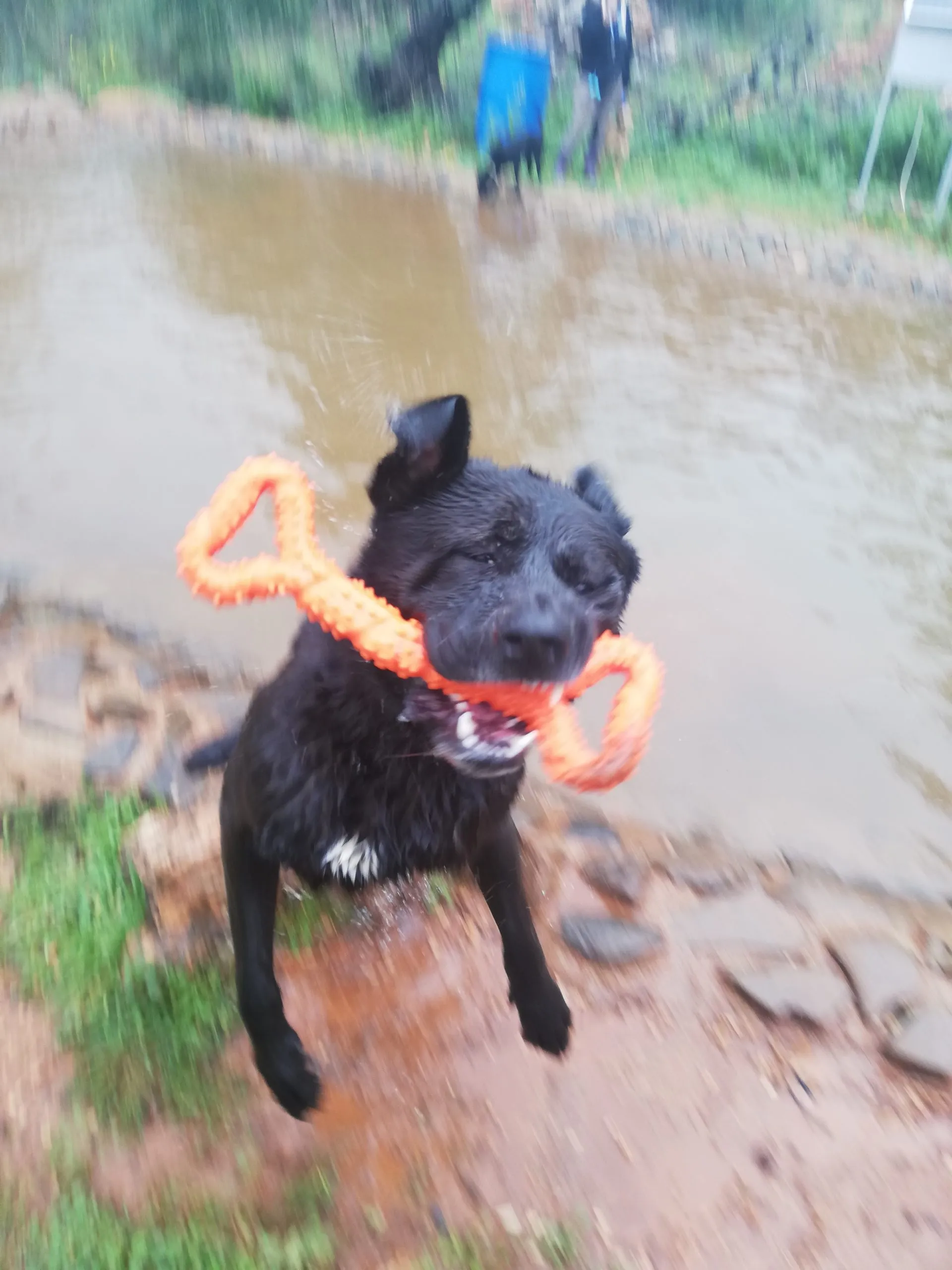
Its soft, rubbery texture and pliable material raised concerns about its ability to withstand extreme testing. Black Nero proved our fears right, as significant damage occurred very quickly.
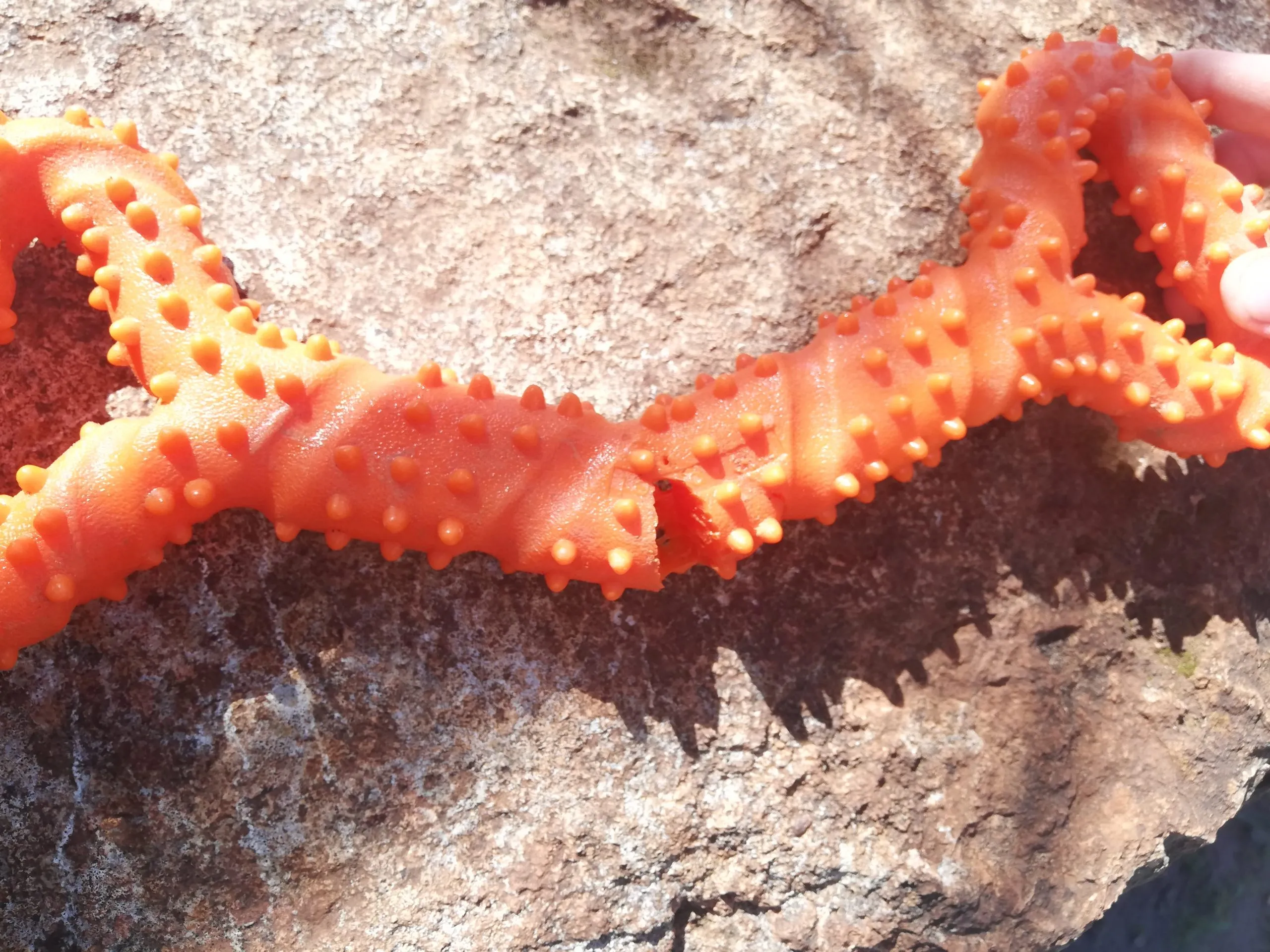
Teeth marks and the bone nearly splitting in two within 30 minutes were the unfortunate results.
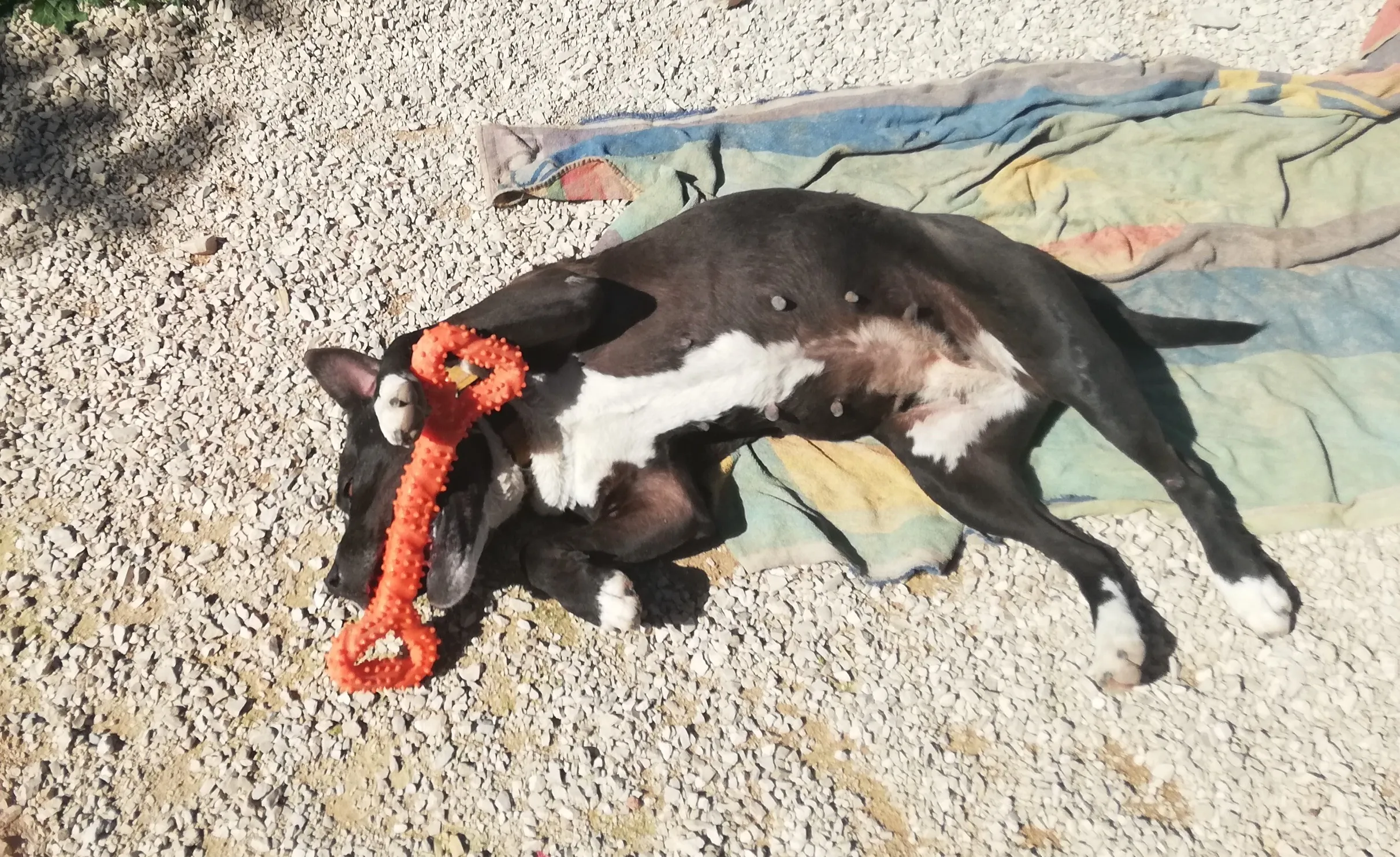
Pebbles playing with the XL orange bone.
Gallery of various dogs testing, click to enlarge
[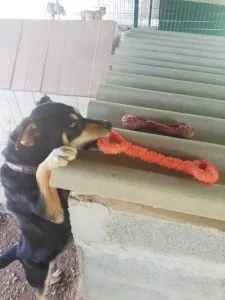
Jean
](https://www.rescuedogs.co.uk/wp-content/uploads/2021/02/jean-orange-bone-768×1024.jpg “Jean”)
[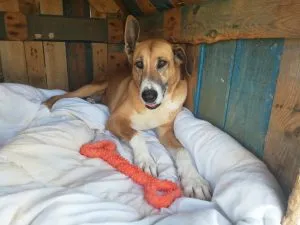
Nora
](https://www.rescuedogs.co.uk/wp-content/uploads/2021/02/nora-orange-bone-1024×768.jpg “Nora”)
[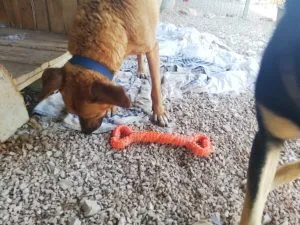
Kilo
](https://www.rescuedogs.co.uk/wp-content/uploads/2021/02/kilo-orange-bone-1024×768.jpg “Kilo”)
[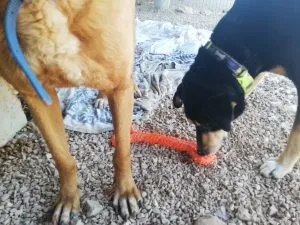
Jean
](https://www.rescuedogs.co.uk/wp-content/uploads/2021/02/jean-orange-bone2-1024×768.jpg “Jean”)
[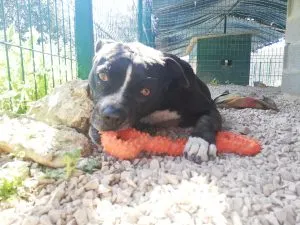
Pebbles
](https://www.rescuedogs.co.uk/wp-content/uploads/2021/02/pebbles-orange-bone-2-1024×768.jpg “Pebbles”)
[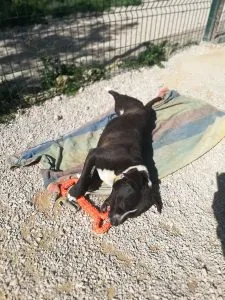
Pebbles
](https://www.rescuedogs.co.uk/wp-content/uploads/2021/02/pebbles-lying-down-bone-768×1024.jpg “Pebbles”)
[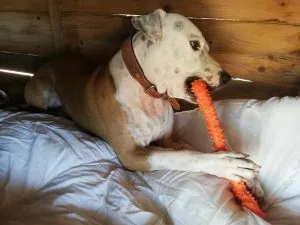
White Nero
](https://www.rescuedogs.co.uk/wp-content/uploads/2021/02/nero-orange-bone-1024×768.jpg “White Nero”)
The Details
- Measurements: 32.9 x 12.2 x 3.8 cm
- Weight: 330 Grams
- Material: TPR environmentally friendly material, no chemical smell, safe and non-toxic.
- Surface design: Helps clean a dog’s teeth and control plaque and tartar.
Summary
Despite being described as strong and durable for medium to large dogs, the results speak for themselves. Indestructible? No. Fun for a short period? Yes. If you’re seeking a toy that will survive prolonged chewing, this is not it. However, if you want a fun retrieval toy that your dog can enjoy for a bit, it was popular for fetching and active play. The dogs were left disappointed by its short lifespan.
HETOO Indestructible Squeaky Dental Care Dog Toy: Lacking Engagement
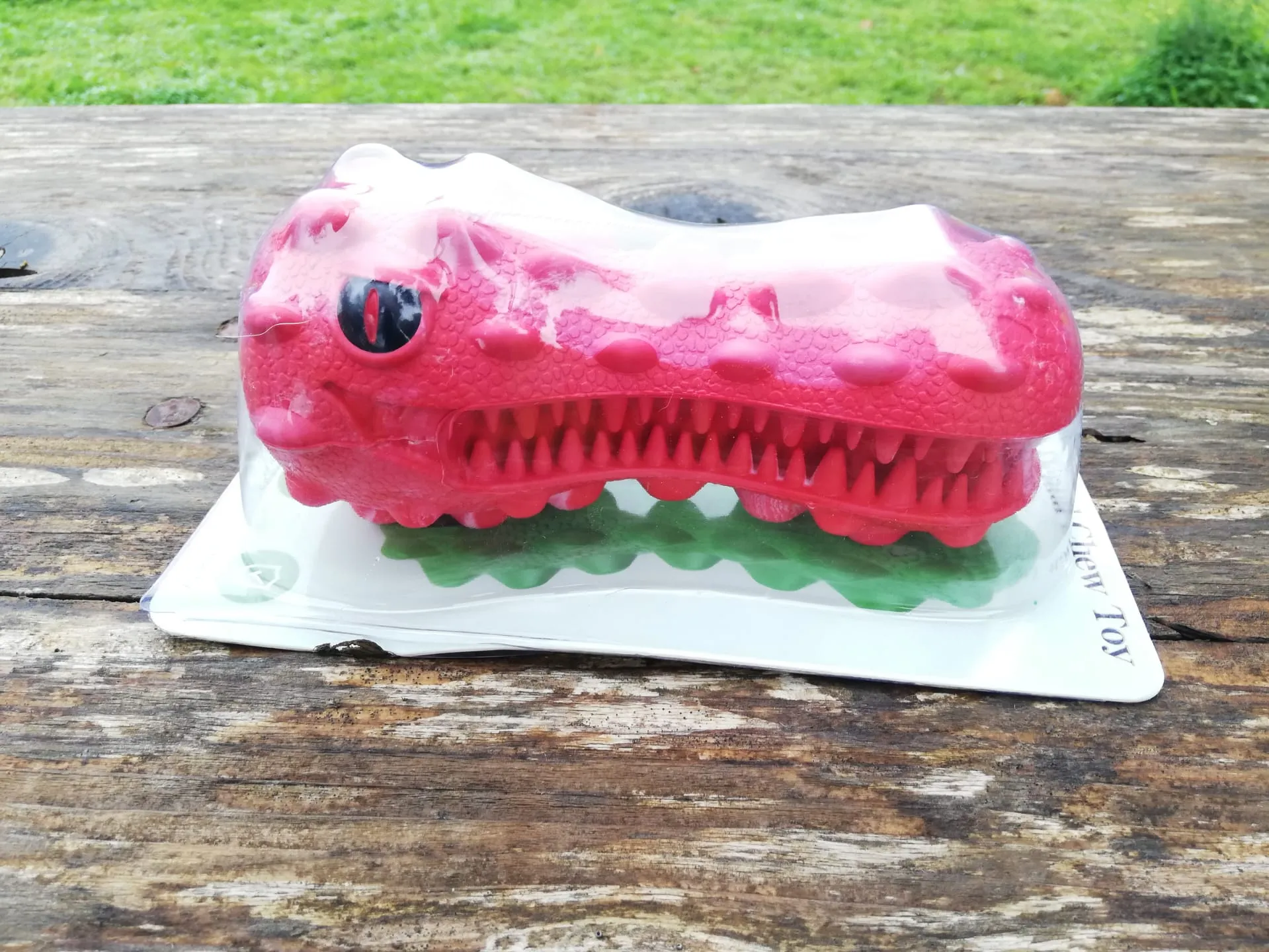
The HETOO toy, primarily designed for dental cleaning, was met with a perplexing lack of enthusiasm from our canine experts. Even the squeak failed to generate excitement. Maya, initially startled by the strange noise, did inspect it for a few moments.
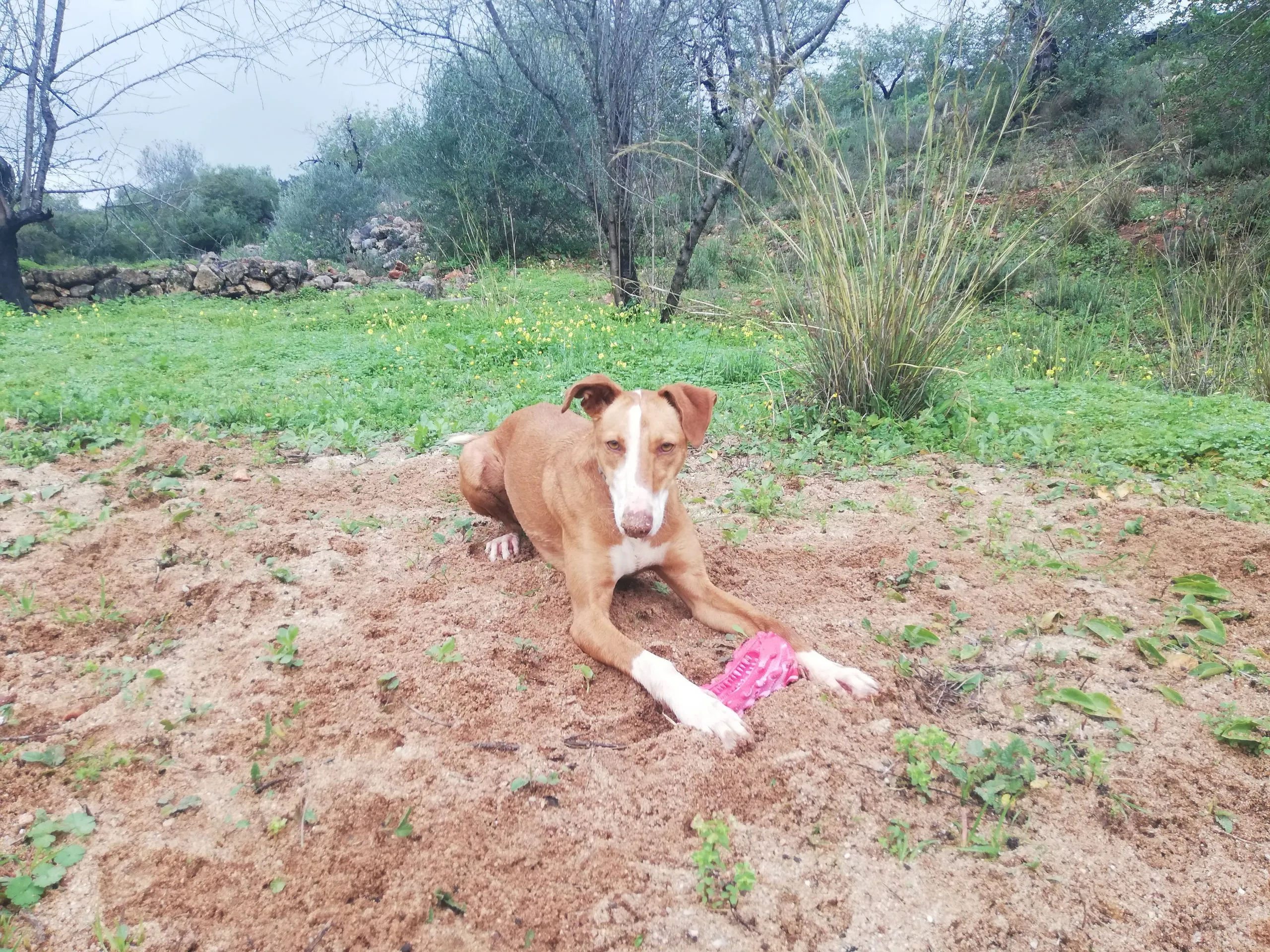
To enhance its appeal, we filled the grooves with peanut butter, which kept Maya interested for a few minutes before she wandered off.
Gallery of various dogs testing, click to enlarge
[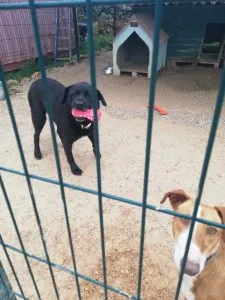
Black Nero
](https://www.rescuedogs.co.uk/wp-content/uploads/2021/02/black-nero-hetoo-orange-bone-1-768×1024.jpg “Black Nero”)
[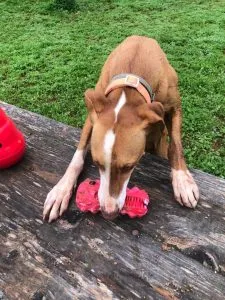
Maya
](https://www.rescuedogs.co.uk/wp-content/uploads/2021/02/WhatsApp-Image-2021-02-11-at-11.37.27-AM-4.jpeg “Maya”)
The Details
- Material: Made from natural rubber
- Measurements: 12.7 x 12.7 x 12.07 cm
- Weight: 417 Grams
Summary
The HETOO toy failed to excite or entertain our dogs for more than a few minutes. Black Nero and Maya showed some interest, but it was very short-lived. This toy is not recommended for aggressive chewers seeking sustained engagement.
Kong Wobbler Interactive Treat Dispensing Dog Toy: A Wobbly Success
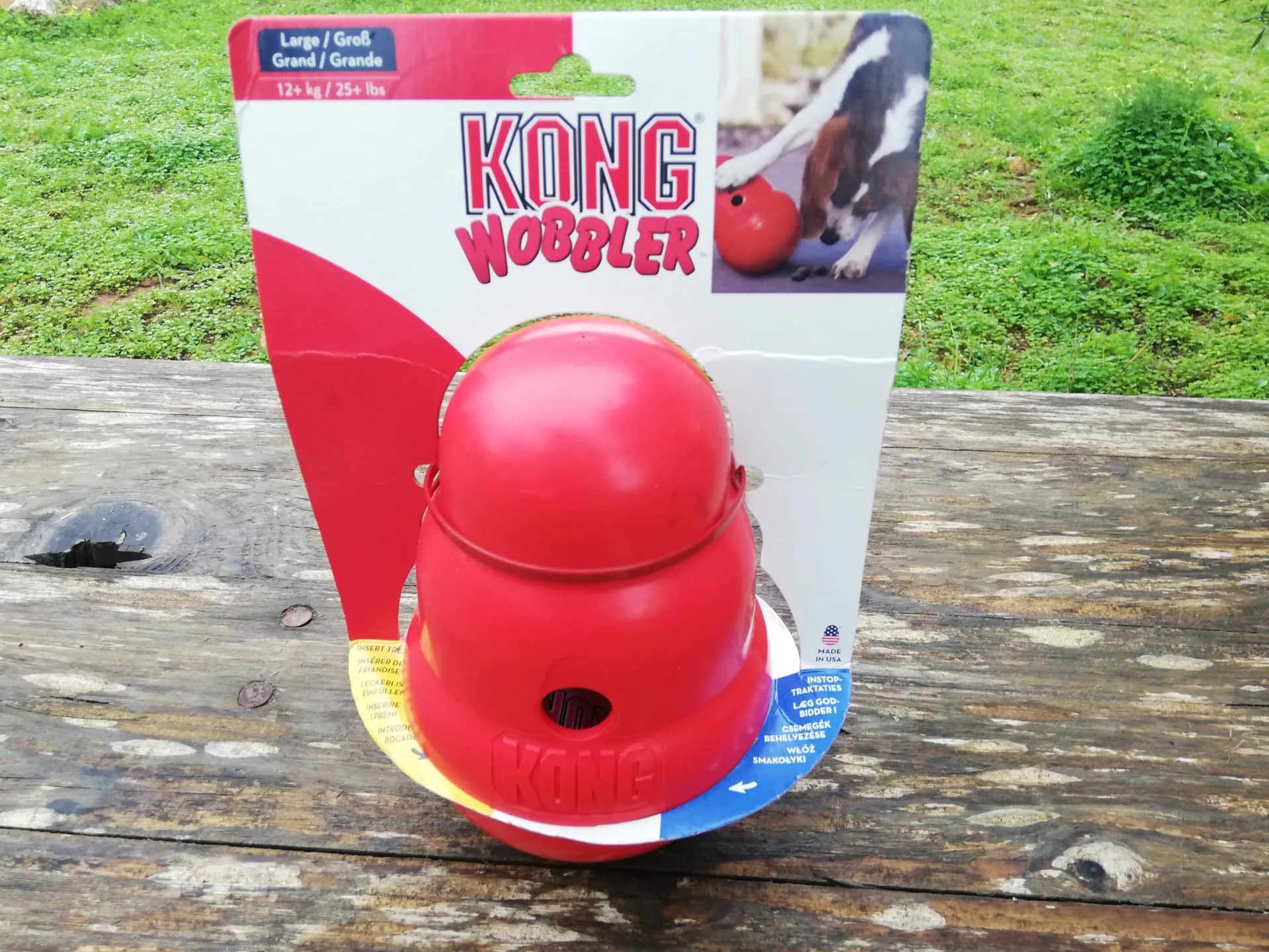
The dogs’ reaction to the Kong Wobbler was amusing, with some uncertain about this peculiar, wobbly object. Made from a hard plastic polymer, unlike other Kong treat toys, it’s not rubber. The twist-off lid makes it easy for humans to fill with treats. Initially, the dogs struggled to get the treats out.
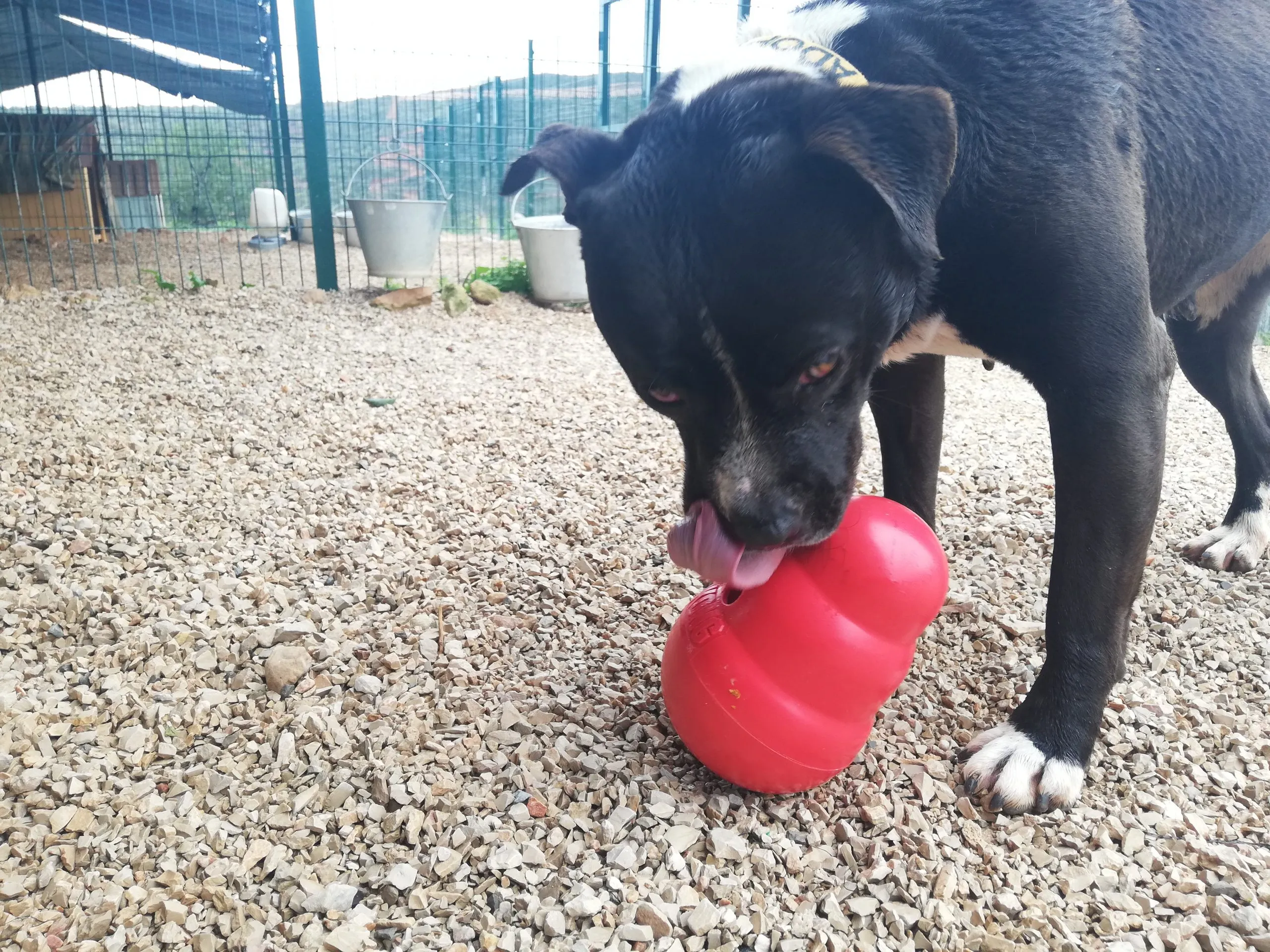
Pebbles helping to review this Kong Wobbler.
After realizing the toy works best on smooth surfaces and that treat size compatibility with the dispensing hole is important, the dogs became quite engaged. The large size makes it difficult for dogs to pick up, which is a positive as it reduces the chances of them biting down hard enough to cause destruction.
Gallery of various dogs trying to wreck a Kong Wobbler
[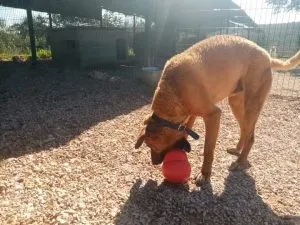
Komo
](https://www.rescuedogs.co.uk/wp-content/uploads/2021/02/komo-kong-wobbler.jpeg “Komo”)
[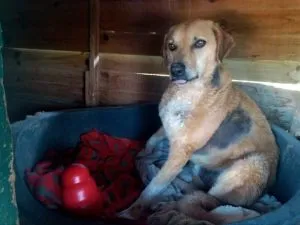
Kilo
](https://www.rescuedogs.co.uk/wp-content/uploads/2021/02/kilo-kong-wobbler.jpeg “Kilo”)
[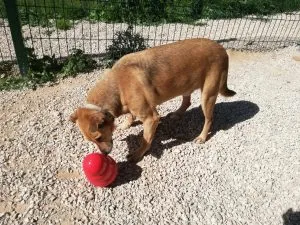
Climber
](https://www.rescuedogs.co.uk/wp-content/uploads/2021/02/climber-kong-wobbler-1024×768.jpg “Climber”)
[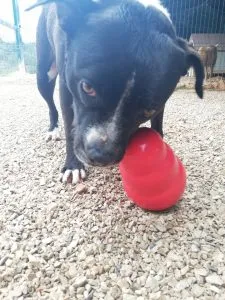
Pebbles
](https://www.rescuedogs.co.uk/wp-content/uploads/2021/02/pebbles-and-kong-wobbler-1-768×1024.jpg “Pebbles”)
The Details
- Material: Made from a Plastic polymer
- Measurements: Diameter 13 x 19 cm
- Weight: 485 grams
- Recommended for: Dogs of 12 kg plus
- Maximum Filling Capacity: 250 grams
Summary
Once the dogs understood the toy’s function and the humans figured out the optimal usage conditions (smooth surfaces and appropriate treat size), the Kong Wobbler was a hit. Its large size limits how much they can get their teeth around it, reducing the risk of destruction. According to our dogs, it’s indestructible and easy to use, provided the humans get it right! This toy offers a good challenge and mental stimulation, making it a great option among top rated dog toys for tough chewers.
Conclusion: Our Dogs’ Ultimate Verdict on Safe Dog Toys For Aggressive Chewers
After extensive deliberation (and plenty of barking), our canine panel has reached a consensus on these five “indestructible” toys.
- Best for Chewers: The Nylabone Extreme Tough Dog Chew Toy stands out for its exceptional durability and satisfying chewing experience.
- Best for Players: The KONG – Rewards Ball is excellent for dogs who love interactive play and a good chew.
- Best Interactive Toy: The KONG Wobbler provides engaging treat-dispensing fun for dogs.
Finding the right best and safest chew toys for dogs is essential for the safety and happiness of your canine companion. While no toy is truly indestructible, the Nylabone Extreme Tough Dog Chew Toy and the Kong Wobbler came closest to meeting that standard in our testing, offering robust solutions for even the most enthusiastic chewers.
